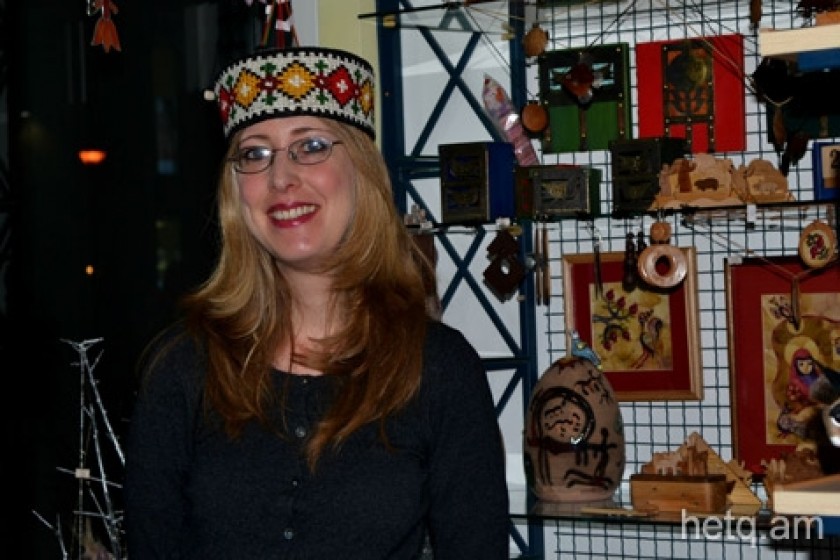
A British Perspective: ‘People in Armenia Don’t See the Good Sides of Their Country’
Katherine Hodgson, a British woman who moved to Armenia in 2013, says jokingly that there are two great things about Armenia – the dry climate and inexpensive hairdressers.
She joked about these observations when I met up with her in Yerevan. Katherine commented that the rainy weather back in England wrecks havoc on her hair, making it curly and unruly. The dry climate of Armenia keeps her hair straight.
Katherine, who has no Armenian roots, now speaks Armenian quite well, albeit a bit slowly. Her interest in the language stems from her learning Greek, which she first studied in London.
She then moved to Greece and studied for her masters at Salonika University. The topic was a Greek dialect spoken by the descendants of Greeks who had relocated to the northern region of Alaverdi in Armenia. She eventually found a private tutor and studied Armenian for six months before returning to Cambridge. Katherine hooked up with an Armenian language instructor in London and began taking online courses with as monthly trip to London.
Katherine wanted to pursue a degree in Armenian at Cambridge University but wasn’t able to get a scholarship due to a lack of interest by school administrators. So she decided to come to Armenia for a year and sharpen her language skills on the spot as it were.
Katherine confesses that while she’s started to learn several languages in the past, and given up afterwards, she’s stuck with Armenian.
She visits the Armenian Apostolic Seminary located in Sevan two times per week where she teaches English. She also writes and translates articles for the website of the Etchmiadzin Mother See.
Katherine says that she even had sort of a job interview with Catholicos Garegin II. Expecting to be asked questions regarding her religious beliefs, she says she was surprised when the church leader asked her questions of a practical nature.
She’s also learning to play the kanon (an Armenian string instrument) after work and can now play a few Armenian melodies. Katherine told me she especially enjoys the works of Komitas and Sayat Nova.
Katherine was also surprised to learn that the events portrayed in Levon Shant’s "Hin Astvatzner"(Ancient Gods), which she has read, took place where she now works – the Sevan Monastery.
What she finds unique about Armenia is how the natural landscape changes from region to region, despite the fact that the country is so small.
The monastery at Geghard took her breath away. “There was something exceptional there that I experienced. It can seem quite normal for you, for a place like that to be so close to Yerevan, but I have yet to visit such a beautiful spot.”
When speaking to me about her experiences in Armenia, Katherine made mention of her parents and how she would like for them to visit Armenia and see the country with their own eyes. When she returned to England for a few days recently Katherine prepared dolma for her parents and says that they enjoyed the meal.
Katherine has made many friends in Armenia and says she doesn’t feel like a stranger in a strange land. She notes that people in Armenia are friendly and go out of their way to help one another. As Katherine describes it members of society are in contact with one another and that this is simple human nature.
She realizes that there’s an unemployment problem in Armenia which forces many to emigrate, noting that in other countries where jobs are scarce emigration rates are lower in comparison.
Katherine chalks this up to Armenians being curious by nature, arguing that Armenians think that the grass might be greener somewhere else.
“People here don’t see the good sides of their country,” Katherine says. “There are problems in all countries.”
Katherine is now thinking of staying in Armenia for longer than the one year she originally planned. Even marrying a local Armenia is a possibility if the right candidate comes along. She says that Armenian men are attentive and more composed than the emotional Greeks.
Whether or not Katherine stays in Armenia depends on the answer she gets from Paris. She’s written two research papers on the Armenian language. A monthly Armenian research journal has offered to publish one of her papers while the other has been accepted fort publication by Anahid Donabedian, Professor of Armenian at the l'Institut National des Langues et Civilisations Orientales - INALCO (Paris).
Donabedian has suggested that Katherine pursue a doctoral degree under her supervision in Paris focusing on Armenian dialects. INALCO wants to prepare a map of Armenian dialects.
If the proposal goes through, Katherine will spend a few years more in Armenia.
 Videos
Videos Photos
Photos
Comments (6)
Write a comment